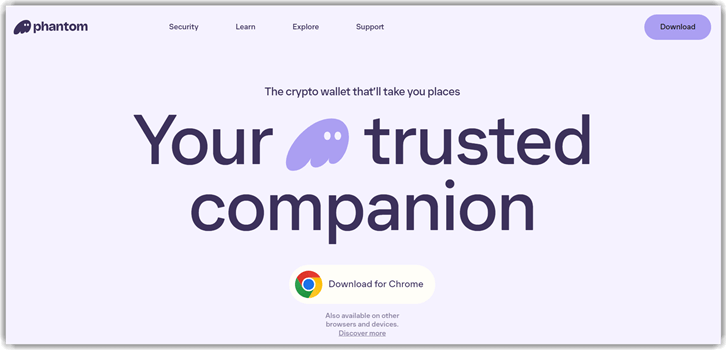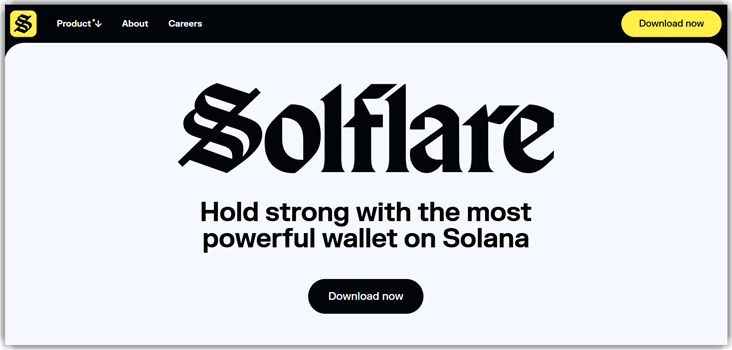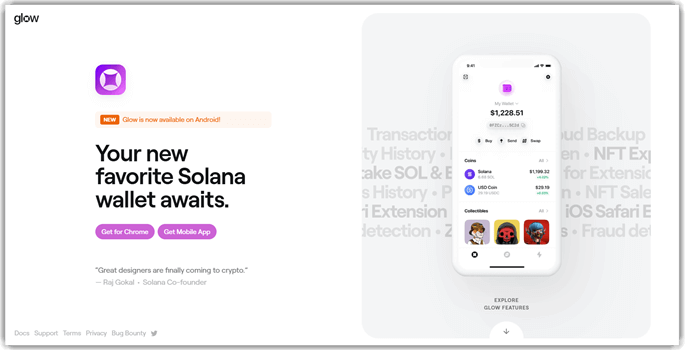6 BEST Solana Wallets (2026)
Solana wallets are essential for engaging with the Solana blockchain, a popular choice for users seeking rapid, low-cost transactions. Ideal for NFT collectors, DeFi enthusiasts, and gamers, these wallets facilitate everything from trading digital collectibles to participating in decentralized finance. They are also crucial for those interested in staking their SOL for passive income or participating in liquid staking protocols like Jito, enabling users to earn rewards. However, users must be aware of inherent risks, including phishing scams, smart contract vulnerabilities, and the potential for losing assets due to compromised seed phrases or malicious dApps.
To bring you this comprehensive guide, I meticulously tested over various Solana wallets, including both software and hardware options. My 140+ hours of dedicated research focused on evaluating their precision, security, and authenticity, especially concerning features like staking and integrating with protocols such as Jito. This guide aims to equip you with the knowledge needed to confidently navigate the Solana ecosystem. Read more…
Zengo stands out as a top-tier Solana wallet with its unique keyless security and user-friendly interface. It offers advanced multi-party computation (MPC) technology, ensuring your private keys are never stored or exposed.
Best Solana Wallets
| Wallet | Wallet Type | Multichain Support | Security Features | Link |
|---|---|---|---|---|
| Zengo | Software (Mobile, Desktop) – MPC Wallet | Yes (Supports Bitcoin, Ethereum, Polygon, and 1000+ cryptoassets; “True multi-chain wallet”) | MPC (no seed phrase), 3D Facelock, 2FA, Web3 Firewall. | Learn More |
| Uphold | Hybrid (Custodial/Non-Custodial) – “Assisted Self-Custody” with Uphold Vault | Yes (Supports over 300 currencies, including crypto, fiat, and commodities) | Multi-signature (Uphold Vault), 2FA, biometrics, KYC, audited reserves. | Learn More |
| Tangem | Hardware Wallet (Card/Ring) | Yes (Supports 81+ blockchains and 6,000+ cryptocurrencies, including Bitcoin, Ethereum, Solana, Cardano, Polygon) | EAL6+ secure chip, offline keys, multi-card backup, tamper-resistant. | Learn More |
| Phantom | Software (Browser Extension & Mobile App) | Yes (Supports Solana, Ethereum, Bitcoin, Polygon, Base, Sui) | Non-custodial, biometrics, hardware wallet support, secure recovery. | Learn More |
| Solflare | Software (Web Wallet, Browser Extension & Mobile App) | Yes (Primary focus on Solana, but supports cross-chain bridging) | Non-custodial, hardware wallet support, anti-phishing, suspicious activity radar. | Learn More |
1) Zengo
After testing several crypto wallets, Zengo stands out to me as the most secure and user-friendly option for managing Solana assets. Its Multi-Party Computation (MPC) feature eliminates the need for seed phrases, enhancing security. The app supports direct swaps, trades, and integration with Solana-based NFTs and DeFi dApps. Zengo is ideal for beginners and NFT collectors, offering easy onboarding, robust security, and 24/7 in-app support. With its 3D FaceLock biometric login, Zengo provides a seamless, keyless experience in the fast-paced Solana ecosystem.
Best Feature: Industry-leading security
Coins Supported: 1000+ including BTC, ETH, USDT, USDC etc.
Supported Payment Methods: Maestro, bank transfers, Apple Pay, and credit cards.
Price: Free
Features:
- MPC (Multi-Party Computation) Security: Zengo uses MPC technology to secure your funds with two independent “secret shares”—one on your device, one on their server. This technology eliminates single points of failure. This makes it more secure than traditional wallets that rely on vulnerable seed phrases.
- No Seed Phrase Vulnerability: Zengo removes the need for a seed phrase, eliminating the risks of loss or exposure. This makes crypto security simpler and safer, transforming how users interact with their wallets.
- Effortless Recovery: If you lose your device, Zengo allows seamless recovery using biometric data (Face ID/fingerprint) and cloud backup. This method is more secure and intuitive than relying on a forgotten seed phrase.
- Solana (SOL) Support: Zengo fully supports Solana (SOL), allowing you to securely buy, sell, send, receive, and manage your SOL tokens directly within the app. This comprehensive integration ensures you have complete control over your Solana assets without needing to transfer them to external platforms.
- In-App Buying and Selling: Zengo allows you to purchase Solana directly within the wallet using various payment methods, including credit/debit cards, Apple Pay, Google Pay, PayPal, and bank transfers. This convenience streamlines the process of acquiring SOL, making it accessible even for newcomers.
- Web3 Firewall (Zengo Pro): This feature protects against wallet draining and phishing scams by analyzing transactions for malicious patterns. It issues warnings about fraudulent dApps or phishing sites, safeguarding your Solana assets in real-time.
Pros
Cons
Pricing:
The fundamental Zengo self-custodial wallet is completely free to download and use. Please refer to the table below for further details:
| Features | Core Wallet Usage | In-App Swaps (Trading) | Solana Network Interactions |
|---|---|---|---|
| Account & Holding | Zengo Essentials is Free to download, create, and manage SOL. Zengo Pro version is priced at $19.99/m | Fees from third-party partners. | Standard, unavoidable blockchain fees. |
| Fees Charged | No fees for wallet functionality. MPC security and basic recovery are free. | Service/Exchange Fees & Spread: Varies by payment method (e.g., 4-8% for card buys), asset, and market. | Very low: Typically, ~$0.0001 – ~$0.01 per transaction. |
Free Wallet
2) Uphold
Uphold is a top choice for crypto investors and DeFi participants seeking seamless multi-asset trading and staking. I found Uphold’s ‘Anything-to-Anything’ feature particularly useful for easily swapping Solana with various assets, making portfolio management effortless. The intuitive interface is beginner-friendly, while advanced users can take advantage of features like SOL staking. Uphold’s Assisted Self-Custody with multi-signature security and recovery options ensures user control in a regulated environment, offering a secure, user-friendly platform for Solana and other assets.
Best Feature: Multi-asset trading
Coins Supported: 250+ coins, including BTC, ETH, XRP, ADS etc.
Supported Payment Methods: Debit and credit cards.
Price: Free
Features:
- Easy Solana Acquisition: You can purchase Solana easily with a bank account, credit/debit cards, Apple Pay, or Google Pay. For beginners, setting up recurring buys with Uphold’s Autopilot tool can help dollar-cost average your investment.
- Competitive SOL Staking: Uphold provides competitive staking rewards for Solana, allowing passive income without the need for a separate staking platform. Rewards are distributed weekly to your account.
- Transparent Proof of Reserves: Uphold maintains 100% reserves and publishes its assets and liabilities in real-time, ensuring transparency and trust. This level of accountability is rare in smaller, single-purpose wallets.
- Recurring Transactions (Autopilot): Uphold’s Autopilot tool enables you to create automated, recurring buy orders for Solana or any other asset at your preferred frequency. This is an excellent feature for implementing a dollar-cost averaging strategy, helping you build your Solana position over time without constant manual intervention.
- Assisted Self-Custody (Uphold Vault): Uphold’s “Assisted Self-Custody” Vault uses a multi-signature setup, where you hold two keys and Uphold holds a third. This hybrid approach ensures control with a recovery option, balancing security and convenience.
Pros
Cons
Pricing:
Uphold functions more as a multi-asset trading platform than a pure self-custodial Solana wallet. Its pricing model primarily relies on “spreads” for trades. Please refer to the table below for further details:
| Features | Core Wallet Usage | In-App Swaps (Trading) | Solana Network Interactions |
|---|---|---|---|
| Account & Holding | Free to create an account and hold Solana (SOL). | Spread-based: Fees are integrated into the buy/sell price. | Standard, unavoidable blockchain fees. |
| Fees Charged | No direct account maintenance fees. | For Altcoins like SOL, spreads typically range from 1.9% to 2.95%. | Very low: ~$0.0006 SOL per transaction. |
Free Wallet
3) Tangem
Tangem offers a sleek, NFC-enabled hardware wallet for U.S. users seeking secure, user-friendly cold storage for Solana. Its hardware-based protection makes it ideal for security-conscious crypto investors and Solana blockchain users. Unlike bulky wallets, Tangem eliminates PIN anxiety and USB fragility. Private keys are stored solely on an EAL6+ certified chip, never leaving the device. I could manage SOL, stake for rewards, and access dApps via WalletConnect by simply tapping the card to a smartphone. With a tamper-proof design and optional multi-card backup, Tangem combines top-tier security and convenience.
Best Feature: Integrated 3rd-party DEX & CEX exchanges
Coins Supported: 16000+ tokens including BTC, ETH, LTC, etc.
Supported Payment Methods: Credit and Debit Cards, PayPal and Cryptocurrency.
Price: $54.90
Features:
- Offline Cold Storage: Tangem stores your Solana private keys completely offline, ensuring maximum security against online threats. Your assets remain isolated from internet vulnerabilities, making it an excellent choice for long-term holdings. This significantly reduces the risk of hacking compared to software wallets.
- NFC-Powered Transactions: Tangem leverages Near Field Communication (NFC) for secure and convenient transaction signing. You simply tap your card to your smartphone to authorize Solana transactions, making the process intuitive and quick. This wireless interaction enhances both security and user experience.
- Multiple Cards for Backup: The Tangem Wallet provides backup cards for your Solana assets. If one is lost or damaged, you can access your funds with another. I recommend that you activate at least two cards upon setup for immediate backup.
- Direct Solana dApp Interaction: Tangem allows secure connection to Solana decentralized applications (dApps) through WalletConnect. This enables you to interact with the Solana ecosystem directly from your cold wallet, enhancing security for DeFi and NFT activities. It’s a much safer alternative to hot wallets for dApp engagement.
- Seedless Wallet Option: Tangem eliminates the need for a mnemonic phrase by using multiple backup cards, reducing the risks of human error or exposure to keyloggers. This feature benefits those wary of traditional seed phrase management.
- NFT: Tangem Wallet allows users to securely store, receive, and manage NFTs across blockchains like Ethereum, Solana, and Polygon, and connect to OpenSea via WalletConnect.
Pros
Cons
Pricing:
Tangem offers a unique hardware wallet experience with its card-based design. Unlike software wallets, you buy the physical cards themselves. Here are the pricing details of the Tangem Wallets:
| Features | Core Wallet Usage | In-App Swaps (Trading) | Solana Network Interactions |
|---|---|---|---|
| Account & Holding | One-time purchase for physical cards. No recurring fees from Tangem. | Fees are charged by integrated third-party providers. | Standard, unavoidable blockchain fees. |
| Fees Charged | ~$50 – $70 USD for 2- or 3-card packs (varies by region/promo). | Service/Exchange Fees & Spreads: Vary based on provider and transaction type. | Very low: ~$0.0001 – ~$0.01 per transaction. |
4) Phantom
For those actively navigating Solana’s dynamic ecosystem, Phantom offers a wallet solution that combines speed, usability, and multi-chain access. I’ve relied on its priority fee (optional) feature during high-volume trades, where quick execution is critical. It caters to both NFT collectors and DeFi participants, offering support for Jito liquid staking and seamless token swaps. Its layered security, including real-time transaction previews and scam alerts, positions it as a trusted Web3 tool. Overall, Phantom is a high-performance wallet designed to meet the demands of serious crypto users.
Features:
- Spam Detection and Burning: The wallet automatically detects and flags spam tokens and NFTs that malicious actors often airdrop. You also have the option to “burn” these unwanted assets, which can sometimes even recover a tiny amount of SOL in the process. This feature offers a practical solution to a common crypto nuisance.
- DApp Browser Integration: Phantom acts as a powerful gateway to decentralized applications (dApps) on Solana, Ethereum, and Polygon. Its integrated browser allows for direct interaction with various DeFi protocols, marketplaces, and gaming platforms, enhancing your Web3 experience.
- Non-Custodial Security: With Phantom, you maintain full control over your private keys, which are stored locally on your device. This self-custodial design is crucial for true ownership and security, eliminating reliance on third parties. It aligns perfectly with the core ethos of decentralized finance.
- Built-in Token Swapping: Phantom’s in-wallet swap feature lets you exchange tokens without leaving the app, saving time and simplifying asset management. I suggest you always check gas fees and slippage tolerance before confirming a swap, especially during high network congestion.
- Solana Staking: Phantom allows you to stake Solana (SOL) tokens directly, earning passive income while contributing to network security. It offers various validator options, eliminating the need to use a separate staking platform.
Pros
Cons
Pricing:
While the core wallet is free, understanding its approach to in-app swaps and network fees is essential for managing your Solana assets effectively. Please refer to the table below for detailed pricing:
| Feature | Core Wallet Usage | In-App Swaps (Trading) | Solana Network Interactions |
|---|---|---|---|
| Account & Holding | Free to download, create a wallet, and store Solana (SOL) and SPL tokens. | Flat fee on swaps, plus network fees. | Standard, unavoidable blockchain fees. |
| Fees Charged | No direct account fees. | Swap Fee: Flat 0.85% fee per swap (for most swaps). | Very low: Typically ~$0.0001 – ~$0.01 per transaction. |
Link: https://phantom.com/
5) Solflare
Solflare is a top choice for anyone navigating the Solana ecosystem, offering an all-in-one solution for DeFi, NFTs, and blockchain gaming. I found its built-in dApp browser and seamless staking options to be particularly useful. Solflare supports managing SOL, SPL tokens, and NFTs, and offers native and liquid staking via protocols like Jito. Cross-chain bridging, hardware wallet support (Ledger, Keystone), and strong security features like anti-phishing protection make it a secure choice for DeFi participants and Solana blockchain users.
Features:
- Multi-Platform Accessibility: Solflare supports desktop, laptop, and mobile devices with its web app, browser extension, and iOS/Android apps. This multi-platform access lets you manage your Solana assets anytime, anywhere.
- Native SOL Staking: Solflare enables direct SOL staking within the wallet, letting you secure the Solana network and earn rewards. Unlike centralized exchanges, it keeps complete control of your private keys and provides transparency on validator performance.
- In-Wallet Token Swaps: Solflare lets you swap SPL tokens directly within the wallet using integrated DEX liquidity. This eliminates the need for external exchanges, offering greater convenience and security.
- Customizable Fee Management: Solflare allows you to adjust transaction fees, giving you control over how quickly your transactions are processed on the Solana network. This flexibility is valuable for optimizing costs during periods of high network congestion or for prioritizing urgent transactions.
- Solana Pay Compatibility: Solflare fully supports Solana Pay, enabling seamless and instant payments to merchants and individuals who accept Solana-based transactions. This pushes the boundaries of traditional payment methods, offering a fast and low-cost alternative.
Pros
Cons
Pricing:
While the Solflare wallet itself is free to use, understanding the associated fees is key to a smooth Solana journey. Here is a pricing overview of the Solflare Solana Wallet:
| Features | Core Wallet Usage | In-App Swaps (Trading) | Solana Network Interactions |
|---|---|---|---|
| Account & Holding | Free to download, create, and manage Solana (SOL) and SPL tokens/NFTs. | Fees from integrated DEX aggregators/liquidity. | Standard, unavoidable blockchain fees. |
| Fees Charged | No direct account fees from Solflare. | Swap Fees: Includes network fees and the aggregator’s small fee/spread. | Very low: ~$0.0001 – ~$0.01 per transaction. Rent Fees: Small one-time (~0.002 SOL) for new token accounts. |
Link: https://www.solflare.com/
6) Glow
Glow is a sleek, non-custodial wallet built for the Solana blockchain, offering a smooth and intuitive mobile-first experience. Users can easily buy, store, send, and browse SOL, SPL tokens, and NFTs, with the added convenience of a desktop browser extension. I found it incredibly easy to list an NFT on Magic Eden directly from the app; it took just seconds. This seamless process and user-friendly design make Glow especially attractive to beginners and NFT enthusiasts who value speed, simplicity, and a well-crafted interface.
Features:
- Seamless Onboarding Process: Glow wallet offers a quick setup with clear instructions to secure your assets and access Solana. It stands out for its simplicity compared to wallets with longer and more complex setups.
- Secure Asset Storage: Glow prioritizes the security of your SOL, tokens, and collectibles with secure key storage like Keychain for iOS and iCloud backups. During testing, I found the iCloud backup option particularly convenient, easing the worry of losing a physical seed phrase.
- In-App SOL Staking: Glow allows you to stake SOL directly within the wallet, earning rewards and contributing to network security. This integrated feature simplifies staking compared to using external platforms, which can be confusing for beginners.
- Transaction Simulation for Security: Glow simulates transactions before approval, blocking suspicious requests for added security. This proactive measure protects you when interacting with dApps. You should always review the simulation details, especially for lesser-known dApps.
- AI-Powered NFT Minting: Glow lets you mint NFTs with Stable Diffusion AI directly in the app. This feature makes NFT creation accessible without technical skills or external tools. It democratizes generative art for all users.
Pros
Cons
Pricing:
Glow Solana Wallet is completely free to use. There are no charges for downloading, installing, or using the wallet on mobile (iOS, Android) or as a browser extension. Please refer to the table below for additional pricing details:
| Feature | Core Wallet Usage | In-App Swaps (Trading) | Solana Network Interactions |
|---|---|---|---|
| Account & Holding | Free to download, set up, and manage Solana (SOL) and SPL tokens/NFTs. | N/A | N/A |
| Fees Charged | No direct account fees. | Swap Fees: Charged by integrated DEX aggregators or liquidity providers, plus network fees. | Solana Network Fees: Very low (typically ~$0.0001 – ~$0.01 per transaction). Rent Fees: Small one-time fee for new token accounts (~0.002 SOL). |
Link: https://glow.app/
Comparison between top Solana Wallets
| Wallets | Zengo | Uphold | Tangem | Phantom |
|---|---|---|---|---|
| NFT support | Yes, view & manage | Yes, through the UpHODL Wallet App | Yes, supports NFTs | Yes, robust support |
| Wallet Type | Software (MPC) | Exchange/Platform | Hardware (NFC Card) | Software (Non-custodial) |
| Staking Support | Yes, for certain assets | Yes, broad asset support | Yes, including SOL | Yes, for SOL |
| Mobile App | Yes, iOS & Android | Yes, iOS & Android | Yes, via NFC pairing | Yes, iOS & Android |
| Browser Extensions | No, mobile-focused | No, platform-based | No, hardware-based | Yes, Chrome, Firefox, etc. |
| Security | Excellent, seedless MPC | Good, 100%+ reserves | Excellent, EAL6+ chip | Good, encryption & HW support |
How to handle network congestion in Solana?
To mitigate network congestion on Solana, developers should implement priority fees to signal transaction importance, optimizing compute unit usage accordingly. Utilizing Stake-Weighted Quality of Service (SWQoS) ensures that transactions from staked validators receive processing priority, enhancing efficiency. Employing advanced retry logic with custom rebroadcasting strategies can prevent transaction drops. Upgrading to the latest validator client versions (Solana mainnet beta update), such as v1.17.31, introduces enhancements like improved transaction scheduling and congestion handling. Additionally, leveraging staked RPC endpoints can provide more reliable transaction propagation during high-traffic periods.
How to use Defi in Solana Wallets?
Solana wallets like Zengo or Uphold act as your gateway to decentralized finance (DeFi) on the Solana blockchain. To engage with dApps, you first connect your wallet. Most Solana dApps feature a “Connect Wallet” button, which, when clicked, prompts you to choose your wallet (e.g., Zengo). Upon approval, your wallet securely links to the dApp without exposing your private keys.
Once connected, you can perform various DeFi activities:
- Swapping Tokens: On Decentralized Exchanges (DEXs) like Raydium or Jupiter, you select the desired tokens and confirm the swap in your wallet.
- Lending & Borrowing: Protocols such as Solend allow you to deposit assets into liquidity pools to earn interest (lending) or use them as collateral to borrow other tokens.
- Yield Farming: By providing liquidity to DEXs, you receive LP tokens, which can then be staked on yield farming platforms to earn additional rewards, often in the form of governance tokens.
Transactions are confirmed directly within your wallet, leveraging Solana’s high speed and low fees. Always ensure you have enough SOL to cover transaction fees.
How does staking on Solana boost your long-term crypto rewards
Staking on Solana boosts your long-term crypto rewards by providing regular payouts. The payouts are typically done every two to three days, in the form of newly minted SOL and transaction fees. These rewards are added to your staked balance, allowing your holdings to grow over time through compounding, especially if you continue to restake your rewards. This process turns your SOL into a passive income stream while supporting the network’s security and decentralization.
FAQs:
Verdict
In this review, you got acquainted with some of the best Solana wallets. All of them have their strengths and limitations. To help you take the final call, I have created this verdict.
- Zengo: A secure, seedless MPC wallet with biometric recovery and real-time support, Zengo is a top-rated, user-friendly choice for managing SOL and integrating with NFTs or DeFi protocols.
- Uphold: With its “Anything-to-Anything” swap feature, this regulated wallet is a reliable platform for managing Solana alongside fiat and commodities, making it a cost-effective choice for portfolio diversity.
- Tangem: If you are deciding on hardware-level protection, Tangem offers a tamper-resistant, seedless card wallet that supports offline SOL staking and dApp interaction via NFC, a powerful combination of convenience and security.
Zengo stands out as a top-tier Solana wallet with its unique keyless security and user-friendly interface. It offers advanced multi-party computation (MPC) technology, ensuring your private keys are never stored or exposed.






